¡Vamos a la Milpa! Sowing Seeds of Hope and Solidarity in Honduras
BY JEAN STOKAN | August 2, 2021
Editor’s Note: Recently, Honduran Jesuit Fr. Ismael Moreno (Padre Melo), the founder of Radio Progreso in Honduras, and Sister Rosa Maria Trochez, SSND, issued an invitation to the SHARE Foundation, to come to Honduras to accompany human rights and environmental defenders and to celebrate an initiative known as Vamos a la Milpa. The following is an interview Jean Stokan, Sisters of Mercy Justice Team, conducted with Scott Wright, Columban Center, upon his return.
The SHARE Foundation’s mission is to strengthen solidarity with and among the Salvadoran people in El Salvador and the United States in the struggle for economic sustainability, justice, and human and civil rights.
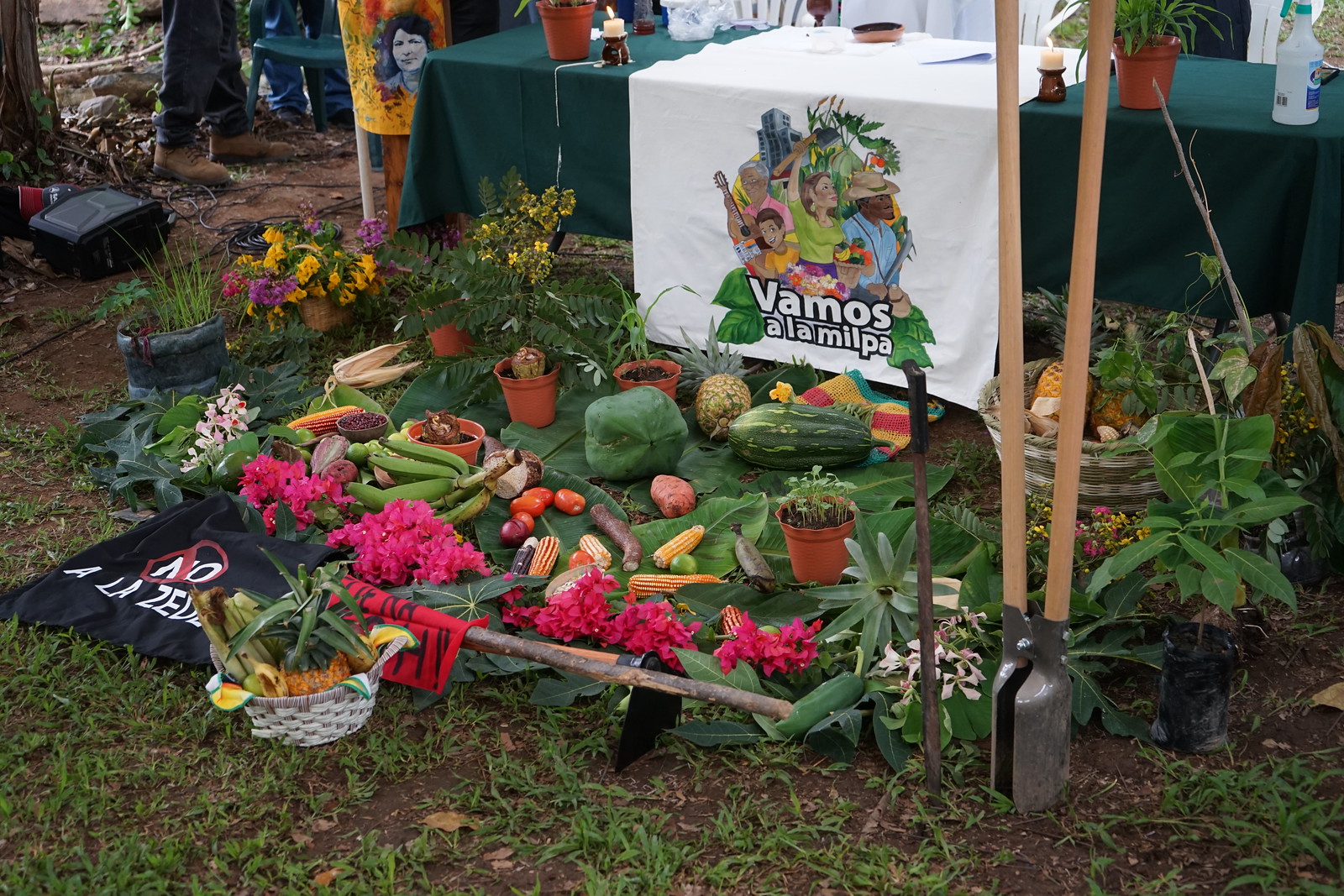
Jean: Why did you say “yes” to this delegation to Honduras, a country suffering from the pandemic and from two devastating hurricanes at the end of last year?
Scott: Yes, for all those reasons. You point out the difficult situation that Hondurans are facing. There is little access to a vaccine—less than one percent of the population has been vaccinated; and hurricanes Eta and Iota have devastated entire communities, destroying homes, displacing families, and driving migration. The SHARE / Radio Progreso Vamos a la Milpa delegation was a call to build bridges of solidarity, not walls, and to support a project that points to the cultural roots of the Central American people—planting a milpa or cornfield—as a sign of hope in the midst real food insecurity.
But all is not well. The extractive model of corporate investment for global export is destroying the environment and criminalizing protests when communities seek to defend and protect their sacred lands and sacred waters. Since the 2009 coup, which the U.S. supported, at least a third of the country has been licensed to mining companies and other extractive industries, robbing the people of their most precious resources, and disappearing or assassinating those who stand in the way. We need to decolonize our foreign policy and respect the rights of communities and peoples to determine their own destiny, not support political elites that will do U.S. bidding in the region.
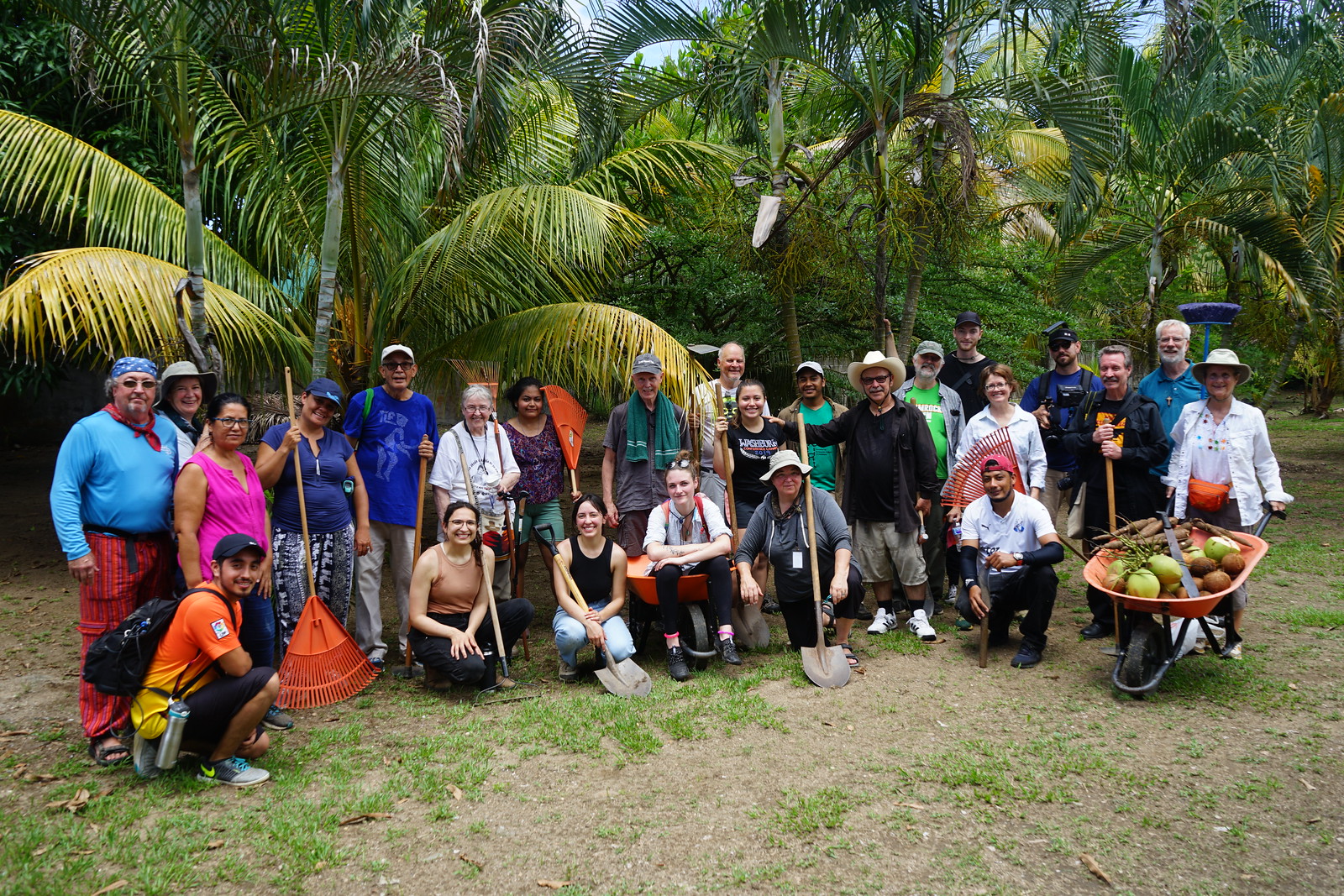
The delegation after a day’s work in the milpa, or corn field.
Jean: Honduras is one of the countries from which people are fleeing for their lives in the caravans. What testimonies did you hear that capture the root causes of migration?
Scott: In recent years, we have called attention to the root causes of migration, including poverty, violence, and climate disasters, but we have not sufficiently called attention to the “root cause” of these root causes. The U.S. has supported corrupt and criminal governments that are imposing free trade agreements and an extractive model of corporate investment, pillaging the country of its resources. This arrangement in turn is backed by military and police violence against those who protest.
If we really want to address the root causes of migration, we need to address the right of people NOT to migrate. We heard many testimonies from people who were desperate, displaced by the hurricanes, or farming on vacant lands to which they did not have title just to survive, and everyone said that migration was their last option. People want to remain in their homes and on their lands, with their families. The U.S., by supporting corrupt governments and extractive economies, backed by state repression, is really the key culprit in driving people north. To say “don’t come” is like setting fire to a house and then telling people not to leave to save their lives.
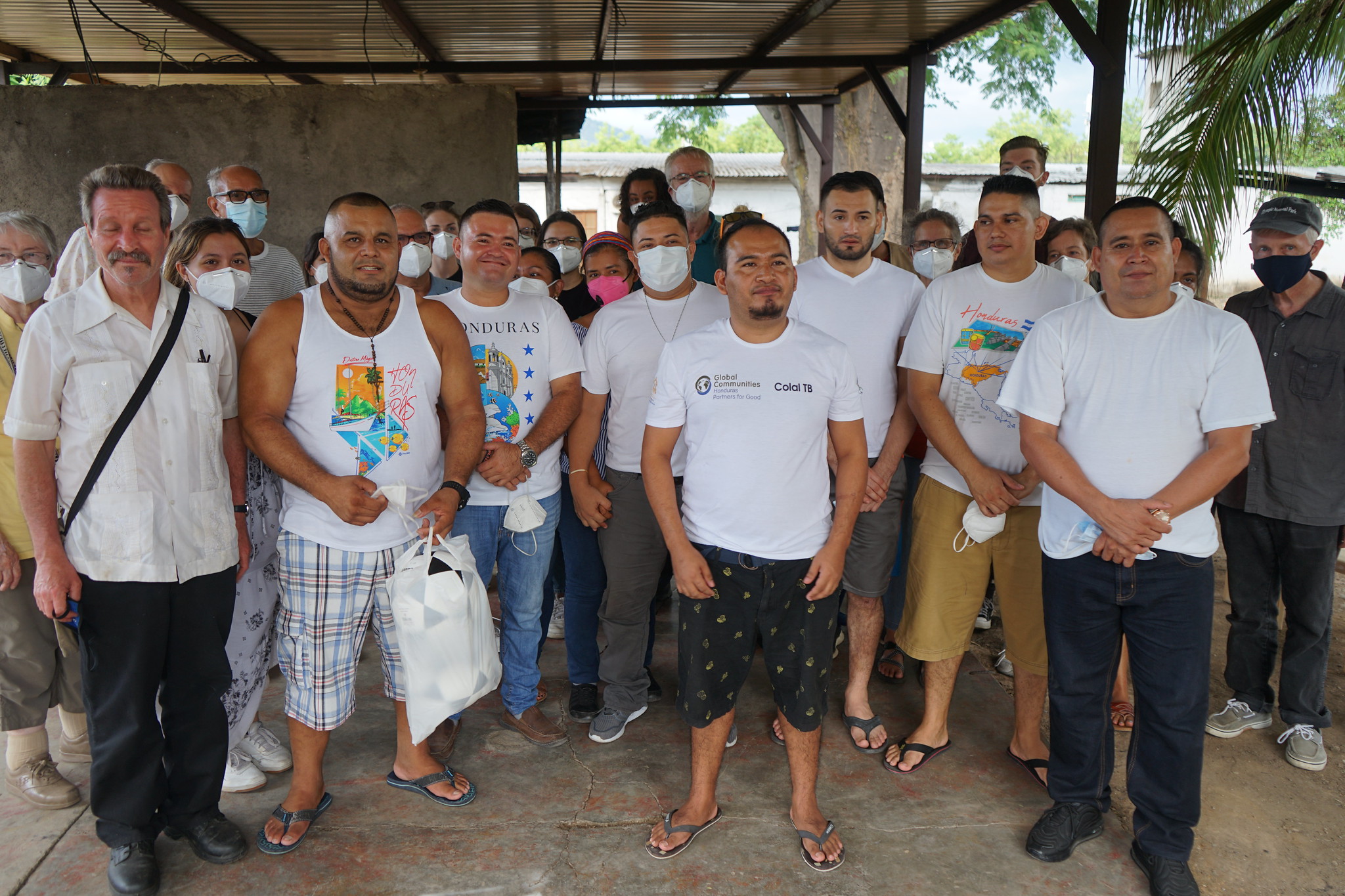
The delegation and family members meeting with Guapinol defenders in prison.
Jean: ISN has followed the case of the Honduran water protectors from Guapinol, unjustly jailed for nearly two years. What was it like for you to visit them and witness the reunion with their families?
Scott: Truthfully, we never expected we would be able to get into the prison in Olanchito where seven of the eight water defenders from Guapinol are being held in “preventive detention.” They are innocent of the charges, yet the Honduran state continues to hold them in prison, and to threaten and harass their community, because they oppose the Los Pinares iron-ore mine that is poisoning their rivers.
It was amazing! Our entire delegation of 24, plus some family members, were able to meet with the seven water defenders. We met outside, but within the prison walls. When they walked up to take their place with us, we gave them a standing ovation. It was so moving, and hard to keep back tears. Families embraced, and then one by one each of the seven passed by and shook our hands, as we stood in a circle. It was an amazing experience of the power of solidarity to effect change, even in small ways such as this.
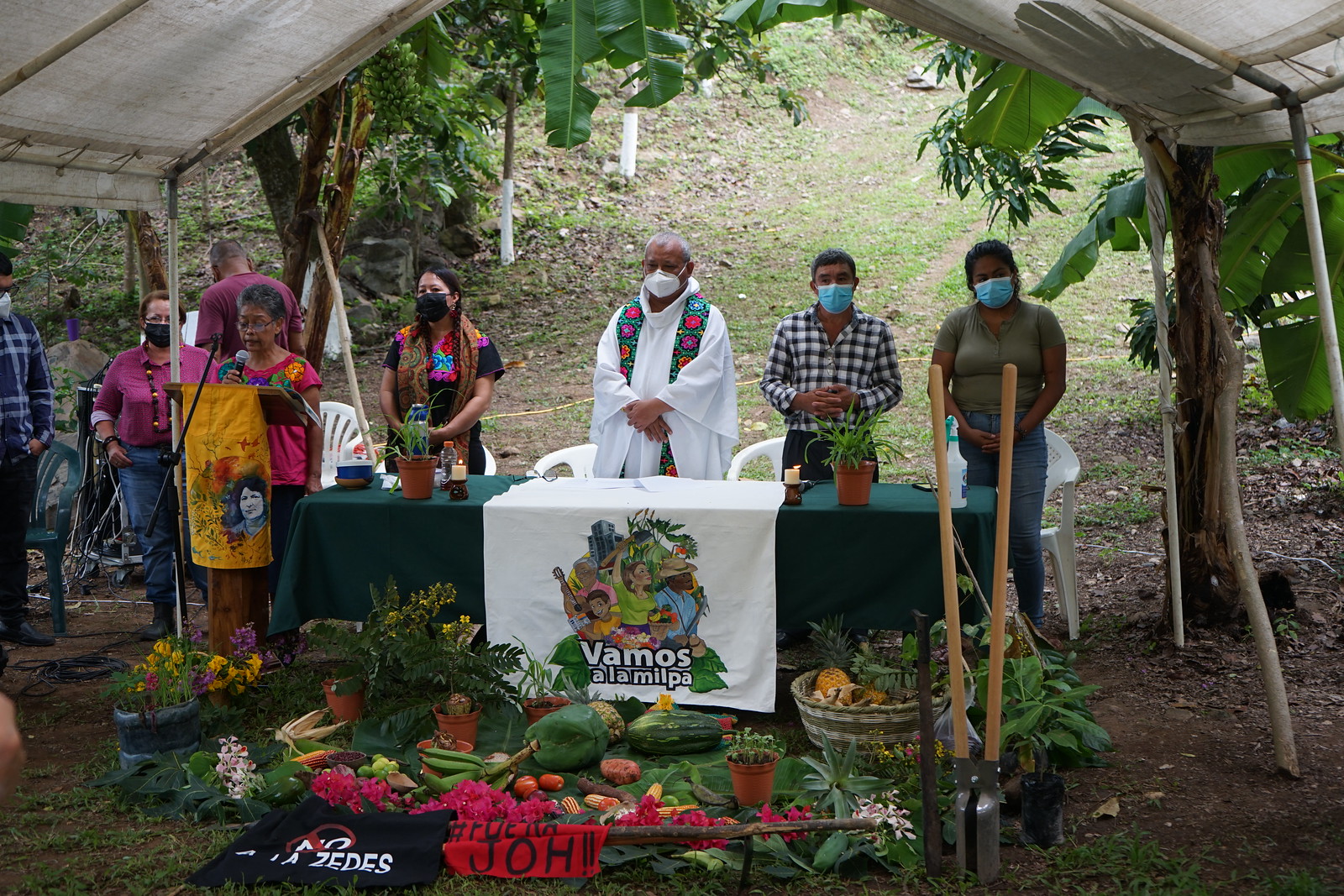
Padre Melo celebrates Mass with the Vamos a la Milpa delegation.
Jean: Can you share other key stories that capture the challenges facing Honduran social movements and human rights defenders?
Scott: I think of an indigenous community we visited, affiliated with COPINH (Civic Council of Popular and Indigenous Organizations of Honduras), the organization co-founded by Berta Cáceres before she was murdered. What was so beautiful was the Lencan altar they constructed on the ground, with candles and grains, representing their cosmovision. Here too people were planting milpas (corn) and filing for title to the land that has been vacant for decades, even as absentee landowners and vigilante groups threaten to evict them. It was one more reminder how much work we have to do.
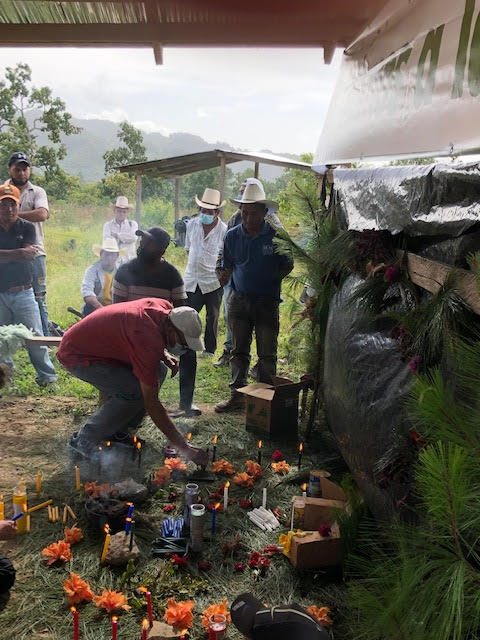
Meeting with COPINH leader Berta Caceres’ daughters and lighting a candle at the Lencan altar
We need to urge the Biden Administration to do two things if they are serious about defending human rights and setting a new course for U.S. relations in Honduras. First, there is absolutely no excuse for continuing to send military and police aid to a corrupt and criminal government killing its people. The administration needs to back the Honduras Human Rights and Anti-Corruption Act in the House and Senate, and the Berta Cáceres Human Rights Act in the House. Second, it’s not enough to pledge $4 billion and open the country to 100 U.S. companies to invest. If the Biden administration is serious about sustainable economic development, it must reject the extractive model of corporate investment that is destroying the environment and pillaging the country of its resources.
Jean: When Vamos a la Milpa was launched last fall, U.S. Congressman Jim McGovern (D-MA) sent a video message affirming it as a source of hope, creating bonds of solidarity. How is this project offering hope in Honduras? How can people from the U.S. help put wind in the sails of such hope?
Hope is really the most “subversive” dimension of this solidarity effort. Vamos a la Milpa is accompanying the Honduran people in defending and protecting that hope, symbolically by helping families plant their milpas, but even more by defending their right to organize in social movements to reclaim their right to their sacred lands and sacred waters.
You asked in the beginning, why did I go to Honduras? Over the years, we have been invited and challenged by so many incredibly inspiring leaders to respond in solidarity, and over time we have become friends. Berta Cáceres was one of those leaders. When she was murdered, we asked ourselves: What else can we do but continue the struggle to honor their great sacrifice of love and hope.
Upon receiving the Goldman Environmental Prize shortly before her murder, Berta offered these words:
“Wake up, humanity! We are out of time. We must shake our conscience free of the rapacious capitalism, racism, and patriarchy that will only assure our own self-destruction. The Gualcarque River has called out to us, as have other gravely threatened rivers. We must answer their call. Our Mother Earth—militarized, fenced-in, poisoned, a place where basic rights are systematically violated—demands that we take action. Let us build societies that are able to coexist in a dignified way, in a way that protects life.”
That is the hope that Vamos a la Milpa is supporting, and we are invited as well to place our own little seed of solidarity in the ground, so that the harvest may be abundant and free of domination.
Jean Stokan serves as on the justice team with the Sisters of Mercy of the Americas, and as vice-chair of the National Council for Pax Christi USA: National Catholic Peace Movement. She has led many dozens of delegations to Central America and the U.S.-Mexico border, and advocates on immigration policy issues in Washington, D.C. She is married to Scott Wright and has a daughter who is a senior social work major at Loyola University Chicago.

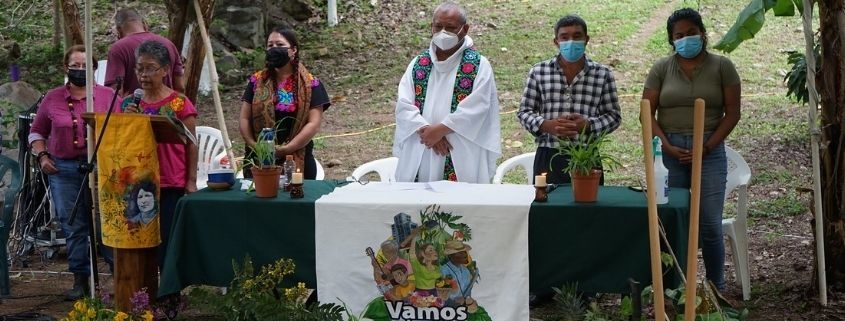
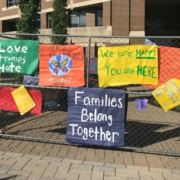
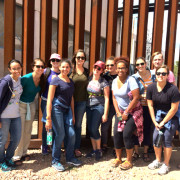
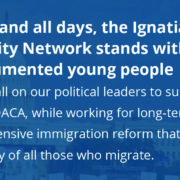
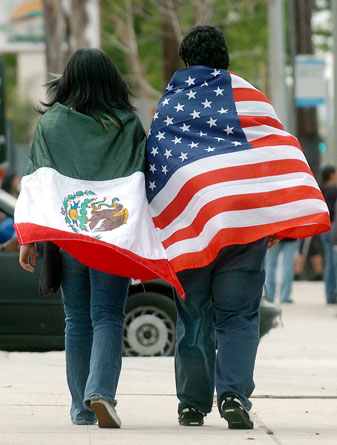



Vamos a la Milpa is a thoughtful initiative. Father Melo is doing fine. Long live the memory of the contributions of the late Berta Cáceres. Wishing Sr Rosa, Fr Moreno, and their colleagues strength and stamina in their mission to the people of Honduras.